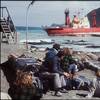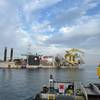Employers and Unions Welcome Entry into Force of ILO
The International Transport Workers’ Federation (ITF) and the International Shipping Federation (ISF) are united in welcoming the news that the ILO Maritime Labour Convention (MLC, 2006) will enter into force in just 12 months’ time, in August 2013, following the announcement that it has been ratified by 30 ILO Member States, the latest being Russia and the Philippines.
The tonnage requirement of at least 33% gross tonnage has also been well exceeded and currently stands at just below 60%.
However, the ILO social partners warn that shipowners will need to ensure they are ready before the new regime of global labour standards comes into force. Significantly, the MLC will be subject to port state control, including the potential for more detailed inspections if ships are thought not to comply, and the possibility of detention in serious cases of non-compliance or where hazardous conditions exist.
ITF and ISF emphasise that the MLC, 2006 has been dubbed the ‘fourth pillar’ of shipping regulation, alongside the IMO SOLAS, MARPOL and STCW Conventions, and as such is likely to be strictly enforced by flag states and port state control.
ave Heindel, chair of the ITF Seafarers’ Section, commented: “The MLC – the seafarers’ bill of rights – is a genuine agent for real change. It has the potential to make a real difference to all seafarers, regardless of nationality or the flag of the ship on which they serve. Its entry into force will be the culmination of over 10 years of collective effort by the ILO social partners. At last, we will have a ‘one stop shop’ for labour standards which we are confident will be genuinely implemented and enforced on a global basis. It means that all seafarers should soon be able to enjoy comprehensive protection of their fundamental rights. It also means good employment practice across the industry so that responsible employers, as represented by ISF, are not disadvantaged by the irresponsible minority.”
ISF Labour Affairs Committee Chairman, Arthur Bowring, commented: “Governments are to be congratulated for ratifying the MLC so quickly. This is a Convention with a very wide scope, incorporating labour and social security requirements, and therefore requires detailed study and potential amendment of local legislation to bring it into effect. We expect many more countries will ratify the Convention over the coming year, so that entry into force will be backed up by truly worldwide enforcement.
“This Convention is the result of tripartite negotiation over a lengthy period, which means that the labour standards which we have all agreed can be supported by governments, shipowners and seafarers giving us a uniform global framework of sound employment standards that is required by both shipowners and seafarers,” Mr Bowring continued.
An important feature of the Convention’s enforcement will be the issue of ‘Maritime Labour Certificates’ by flag administrations following an inspection. There is also a requirement for ships to complete and maintain on board a ‘Declaration of Maritime Labour Compliance’
The MLC addresses a wide range of matters, including the obligations of shipping companies with respect to seafarers’ contractual arrangements, the responsibilities of manning agencies, working hours, health and safety, crew accommodation, catering standards, and seafarers’ welfare.
Under the tripartite ILO process, ITF and ISF were responsible for negotiating the text of the new Convention with governments, on behalf of maritime employers and seafarers’ trade unions, prior to its adoption in 2006. ITF and ISF therefore are keen to see the smooth implementation of the MLC, 2006 when it enters into force in 2013.
Mr Bowring added: “The vast majority of companies should have no difficulty complying with the substance of the Convention, since in large part this is derived from existing ILO maritime standards and accepted good employment practice. However, the enforcement mechanism is new, and it will be important to avoid teething problems when some of the more detailed requirements are applied and interpreted. It will therefore be most important for all ship operators to ensure that they are ready.”
Mr Heindel concluded: “The shipping industry is almost certainly unique in having such a comprehensive global framework of employment standards, which is supported on all sides. While there will be lot to do to ensure that the standards are properly enforced in a year’s time, I think this is a moment when all concerned can take credit for what has been achieved by the adoption of the MLC, 2006, and the really tangible benefits that this will bring both to shipowners and the seafarers they employ.”













